- Home
- Chevy Stevens
Always Watching Page 3
Always Watching Read online
Page 3
She said, “They’re a revolution, and we’re going to be a part of it. We’re going to change the world, kids.”
Both Robbie and I knew that she wasn’t going to change anything, except probably her mood in another day or so, but we also knew it was best just to go along with her. She would come down eventually, and then we’d go home.
Now she pulled some old suitcases out of the closet and handed them to us. “Pack your clothes and anything else you want to bring.”
Robbie and I looked at each other, then he nodded: Just do as she says, it will be okay. I was scared, but I trusted Robbie.
All I brought were some clothes and my books. When we were finished, we found Mom outside by the truck, her suitcase and bags full of food already thrown in the back. Our dog, Jake, a black border collie mix with one blue eye, followed us out of the house, his tail wagging in concern, and an anxious whine leaking from his throat. Terrified she was going to leave him—we had two cats, Jake, and a couple of horses—I said, “What about the animals?”
She paused in the middle of throwing some of Dad’s tools in the truck, a confused expression on her face, like it was the first time she’d even thought about our pets. After a moment, she said, “We’ll take them. They should be free too.” She turned to us, her eyes lit up with frantic energy, her skin coated in a fine sheen of sweat. “You kids don’t know how lucky you are. You’re going to experience something amazing. Your lives are going to change forever.”
* * *
The commune was in a clearing alongside the river, hidden from the logging road, which leads up to Glen Eagle Mountain, by a thick wall of forest. The river wrapped around one side of the clearing and glimpses of jade green pools were visible through the trees. As we came into the center of the camp, the forest opened up beside the river to reveal a sandy beach, with the odd dead tree from winter runoffs littering the shore. One tree made a makeshift clothes hanger as a woman did her laundry in the water, soap bubbles frothing in the current. Across the river, the high bank was a sheer dirt wall, trees and ferns clinging to the earth as it eroded from underneath their roots.
There looked to be at least a couple of dozen people living at the site, the women dressed in loose dresses and skirts, their hair long. The men wore cut-off jeans, their chests bare, also with long hair and beards. Cats, dogs, chickens, and kids were roaming free, and there was a tangible air of excitement in the air. It was cold, and it had snowed the week before, but some of them were living in tents. Two old yellow school buses had been converted into sleeping areas, and there were signs that they were building more cabins. A couple of horses grazed in a meadow to the right of the main clearing. I also noticed a tractor, and pens with goats and pigs. A group came to greet us, pulling us in for hugs, touching and stroking our hair as they welcomed us to their camp. One blond woman, smelling of cedar and smoke, turned to my mother.
“Peace, sister. What’s your name?”
“Kate. These are my children, Nadine and Robbie.”
The woman smiled. “Welcome, Kate. I’m Joy.”
A tall kid with red hair and freckles, who looked about the same age as Robbie, came over and introduced himself as Levi. He clasped Robbie on the shoulder. “Welcome to our camp, man. Want to meet some cool chicks?”
As they walked off, I said, “Robbie, wait.” But he was already out of earshot, moving toward a couple of teenage girls, who looked happy to see Robbie. Since he’d turned sixteen, girls had been flocking to him—tall, with lean muscles from working on our ranch, shaggy black hair framing his face, and a perpetual tough-guy scowl, he looked like a moody rock star.
Mom was following Joy toward one of the cabins and gestured for me to come along.
I said, “You said we had to unload the horses from the trailer.”
Over her shoulder, she said, “We’ll do it in a minute.” She turned back to Joy. “Nadine’s my little rule follower.”
It was true. I did crave the comfort of rules, of science and math. With a mother as mercurial as mine, I was constantly searching for absolutes. I stood near the truck, wishing Mom had left the keys. I didn’t like the camp, the way it smelled, a bitter, metallic scent. The scent my mother gave off in her manic phase.
Then I saw an attractive young man, maybe early twenties, sitting on a log at the side of the clearing. The winter sun slanted down through fir trees and made his hair, a thick mane of chocolate brown, glow with rich tones and bathed his face in light. His dark brown eyes, with long eyelashes, had an almost sleepy look to them, and his cheekbones were high, creating shadows and hollows on his face. His mouth was full, the lips perfectly symmetrical and turned down at the corners. He also had a full beard, even darker than his hair, and he was wearing jeans, a tan corduroy jacket, and a string of leather tied around his neck. He was watching me as he held an old guitar, the embroidered strap across his chest. He smiled and motioned me over. I wanted to stay near the truck and shook my head. He shrugged, gave a wink, and started to strum the guitar, softly singing.
Jake, who’d been guarding my feet, sauntered over. The man paused his singing and ruffled the fur around Jake’s neck. Jake didn’t like anyone normally, but he rolled onto his back, wiggling on the ground. The man laughed and rubbed his belly with his foot. I was a cautious, distrustful kid by nature. But when the man lifted his head and said, “What’s his name?” I left the safety of the truck.
CHAPTER THREE
I promised Heather and Daniel again that she was safe on the ward and reminded them that anything they shared would help me treat her. Then I finished my rounds and entered my notes on the patients’ charts, all the while trying to ignore the dark feeling closing in around me, the question clamoring in my head.
Could it really be the same people?
Finally I had finished all my appointments at Mental Health, and my day was over. Each night when I got off work I’d take a detour down Pandora Street, where the homeless camp out, and search for the tall frame of my daughter, Lisa. She was turning twenty-five that March, and I wondered the same things I’d wondered every year since she had packed her bags at eighteen: Would I get to see her? Would she call? In the background there was always the more frightening thought: Would she make it to her next birthday? Each time the phone rang, I’d hold my breath, terrified the police were calling to say they’d found her body.
I parked my car and walked up and down the street, studying the clusters of street kids, wondering if their parents also lay awake at night worrying. It was cold, and I was tired and hungry, but I took another lap around the block, eyeing misshapen lumps sleeping under dirty blankets, straggly, unwashed hair, scarred arms, feeling a surge of hope when I’d see a young woman, followed by a crash of despair when I’d realize it wasn’t Lisa. I had no idea how vast the streets of Victoria were until my child was lost on them. How many dark alleys and abandoned buildings there were, or how helpless it would all make me feel.
When I didn’t find Lisa anywhere, I headed home. I’d moved from Nanaimo, a city about an hour and a half north of Victoria, on the first of December, in the hopes of connecting with her. Back in July, before I’d made the final decision to move, I continued with my practice for a couple of weeks, not wanting to leave my clients without a support system. Once I had referred any remaining clients to an excellent therapist in town, I took the rest of the summer off and traveled. That fall, I’d just put my house on the market, still considering opening a private practice in Victoria, when a job came available for an adult general psychiatrist at St. Adrian’s Hospital. My house sold soon after.
Now it was February, almost two months later, and I was still getting used to Fairfield, my new neighborhood in Victoria, a lovely community with tree-lined streets surrounded by Oak Bay, James Bay, Rockland, Beacon Hill Park, and to the south, the ocean shoreline of the Strait of Juan de Fuca. Normally I took my time, so I could admire all the heritage buildings, but today I was too distracted, and sighed in relief when I pulled in the drive
way of my new home.
Set on a street of older Victorian homes, my house was an architect’s funky blend of West Coast natural with Asian contemporary: all strong angles, golden-stained wood exterior on the lower part, steel blue HardiPlank siding on the top half, and broad sheets of glass windows, trimmed in thick white casings. An aluminum roof jutted down in a slash of silver, and there was even a penthouse deck for morning tea. Bamboo in big black ceramic planters lined the front steps and walkway, setting off the amber-stained wood fence and gates with their black hinges. The garage had been turned into a potting shed in the back, perfect for my new hobby—bonsai trees, an art form I’ve long admired and yet to master. I’d taken a class on a lark and ended up finding the discipline extremely relaxing. I spend so much time in my head that it was nice to do something creative for a change. The careful shaping and cultivating of a tree over a long period of time also reminded me to be patient with my clients.
Before I got out of my car, I did a quick check of all my mirrors to make sure no one was lurking in my driveway. I’d been attacked outside my office that summer in Nanaimo—another reason for my move, though I had already been thinking about it. I hadn’t broken any bones but I’d been knocked unconscious and never saw my assailant. A patient at the time had been involved in a situation with her birth father, whom we originally suspected of assaulting me. But as the investigation continued, it seemed less likely. Another of my patients had recently left her husband, who viewed her sessions as an abandonment of her wifely duties—something he communicated with his fist to her face. When her husband confronted me, I refused to tell him where she was staying. A week later, I was attacked. The police couldn’t prove it was him, but I was sure of it.
I let myself into my house, stopping to notice a stray black cat, all skin and bones, saunter across the road and head toward Ross Bay Cemetery. I hoped she had somewhere warm to hide. My last cat, Silky, had passed away in June, and I hadn’t been able to bring myself to adopt another, telling myself it was because I wanted to travel, knowing it was because I wasn’t ready. Inside the safety of my home, I had a bath to wash away the smell of the hospital, put on my favorite dove gray yoga outfit, made a cup of tea, and then, and only then, did I let myself think about what I’d heard at the hospital—and what I was going to do about it.
* * *
My mother had told us that the commune moved down to Victoria not long after we left, and I’d assumed they’d eventually split up. Once, in my early twenties, I’d been driving on the mountain roads with a boyfriend, looking for a good swimming hole, and recognized the old entrance to the commune site. He’d wanted to stop and explore, having heard the rumors about a group of hippies that had camped there. I didn’t divulge that we’d also lived there, but I’d been curious too. We’d walked around the site, now overgrown, and it had felt like visiting a ghost town. The barn and cabins empty, doors hanging open and windows broken, our voices hushed in the still forest. I’d become anxious the closer we got to the river, my heart beating fast and my chest tight, and had made him leave, assuming that it was just the silence and the dark woods that had frightened me.
Under my therapist’s guidance a few years later, I had talked about the months I spent at the commune, sharing memories that I had of the place, the other members, my brother and mother, swimming at the river, the late-night campfires. But I never could recall any specific event that might’ve caused my claustrophobia, and hours of hypnosis never revealed anything further. There was just this murky sense that I hadn’t liked some of the things that the adults were doing, and I’d been uncomfortable around Aaron, the young man I’d met that first day, and Joseph—his younger brother. Sometimes I felt like there might be things I was forgetting, gaps in my timeline, but nothing that I could put my finger on.
Now I couldn’t believe that they were still in Victoria. I was curious about what the commune was like these days and whether the same people lived there.
* * *
That evening I spent some time online, reading about The River of Life Spiritual Center. It didn’t take long to find their Web site, with its mission statement, “Guiding you on your journey to enlightenment.” There were glorious photos of the commune, situated on more than 250 acres of land, where the river joined the ocean. I hadn’t been to Jordan River for years, but I remembered that it was a small community about an hour west of Victoria. Originally a logging camp, there wasn’t much in the way of a village, just a couple of cafés and a general store.
The commune land seemed to be mostly forest and hiking trails, but a big chunk was farmland, part of their stay-and-work program. It sounded like a fascinating place to visit, with its descriptive passages about the healing properties of the land, the intellectual and soul-fulfilling workshops on meditation, spiritual awakening, relationship building, living and dying consciously, blending East and West philosophies toward achieving your highest potential. There were sweat lodges and mineral pools, elaborate gardens, and descriptions of organic food grown on the property, all extolling the virtues of a simple, balanced way of living.
The Web site described the friends you’d make, the greater understanding you’d gain of yourself and life as you learned about the all-embracing world, your newfound self-confidence and personal satisfaction. There was a lot of emphasis on being a steward of the land, that humans must take responsibility for the earth. I thought of Heather’s words the first time I met her. We take care of the earth.
They also gave back to the community and helped countries around the world. There were photos of people digging ditches, working in fields, building structures. There was a donation button, and I wondered how much money was actually used to help these struggling countries.
I was impressed—and surprised—at how professional they’d become since the sixties, and what they’d grown into. They were obviously a sizable organization now, with centers in three countries, and probably very wealthy. They had elaborate online catalogues, opening with a letter from their director, Aaron Quinn.
I stared at his photo. Gone was the long hair and straggly beard. His hair was now snow-white, neatly trimmed, and so was his beard, but he was still an attractive man. He was wearing a dark turtleneck and smiled kindly at the camera, a wise expression in his eyes. He looked exactly like what he presented himself as: a director of a center devoted to self-awareness and spiritualism. But as I studied his face, I felt myself drawing back in my chair, wanting to put some space between us.
I read his opening letter, about how he’d formed the center because he believed it was more important than ever, with the current global-warming crisis, to awaken people to the earth’s plight. They commanded large fees for workshops and intensives, ranging from a weekend to a month—if you were accepted into the program. They would only take so many at a time. Members had to apply to stay on and live permanently at the commune. I wondered what that was evaluated on. I also wondered what had happened to Joseph. I tried to calculate his age, and if he was eighteen when I knew him, he’d be almost sixty now. Aaron, twenty-two, would be in his early sixties.
I looked again at Aaron’s photo, his tranquil smile making me suddenly angry when I thought about Heather in the hospital, her wrists bandaged, blaming herself for the loss of her child. I turned my computer off.
CHAPTER FOUR
The next morning, I woke late and groggy. Though I had no appetite, I made myself eat a muffin on the way to the hospital, washing it down with a tea that I grabbed at the corner coffee shop. I was hoping to talk to one of my colleagues before my rounds. I’d decided it was probably better for Heather if she had a doctor who had no previous involvement with the commune, but I wanted to discuss it with someone first. As I headed down the hallway toward the unit, I ran into Michelle. She smiled and said, “Good morning, Dr. Lavoie.”
I smiled back. “Morning.”
She stopped and looked at my scarf. “I love that. What a pretty color.”
I glanced down at the la
vender scarf. I’d been distracted that morning and barely remembered putting it on. “Thanks. I’ve had it forever.”
“You always dress so nice. Well, have a good day.”
“You too.”
She continued on her way, leaving me feeling lighter in spirit than when I’d first come through the doors. Michelle was a lovely person, always positive and complimentary. A few days earlier in the break room, I’d told her I was turning fifty-five this month. She’d paused with her mug halfway to her mouth, and said, “You’re kidding me. I thought we were around the same age.”
Michelle was probably only in her mid-forties. I laughed. “I wish.”
She said, “Well, you look amazing.”
“That’s very kind.” I know that I look young for my age—I’ve taken care of my skin and eat healthy, though I struggle with an addiction to popcorn and peanut M&Ms. I balance it out with bike rides and yoga. Since I stopped dyeing my hair in my forties, deciding that it was just too much trouble, I’d come to like the silver, which was now in all different shades, ranging from nearly snow-white around my face to almost black on the underside. I used to wear it in a short, choppy cut, but I’d been letting it grow, and it now fell just past my shoulders.
To work with my coloring, I wear clothes in shades of gray and steel blues. I favor a bohemian style—long skirts with boots, loose flowing slacks and tunics, chunky silver jewelry, wraps and scarves, which fits with my love of art and traveling. Sometimes I wonder if I was a gypsy in a former life. But there’s another part of me that just loves to be home. Paul used to say, as we bathed together and drank wine straight from the bottle, “You’re a complicated woman, Nadine. I’m looking forward to spending the rest of my life figuring you out.”
My heart panged, like it did every time my thoughts drifted to my husband, Paul, who’d passed away ten years ago from prostate cancer. I had the love of my life, but now my work and my patients were my relationship.

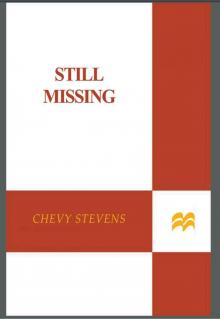 Still Missing
Still Missing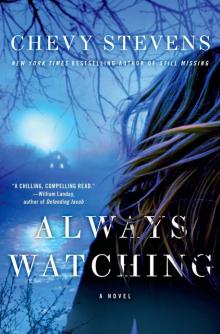 Always Watching
Always Watching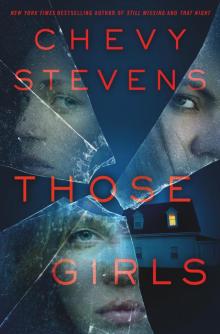 Those Girls
Those Girls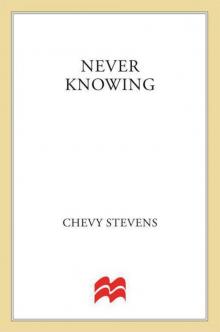 Never Knowing
Never Knowing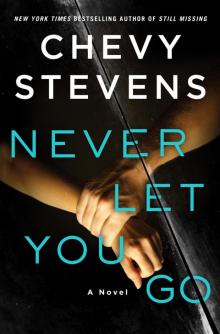 Never Let You Go
Never Let You Go That Night
That Night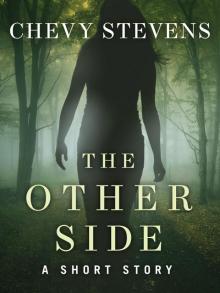 The Other Side
The Other Side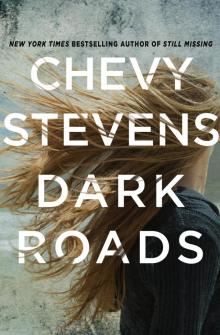 Dark Roads
Dark Roads